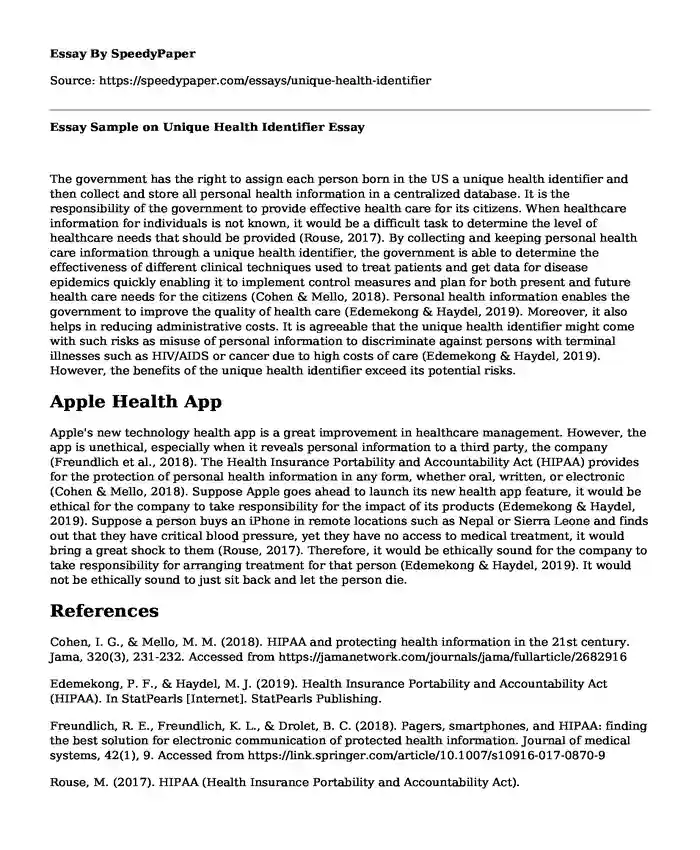
| Type of paper: | Essay |
| Categories: | Company Healthcare policy Ethical dilemma |
| Pages: | 2 |
| Wordcount: | 468 words |
The government has the right to assign each person born in the US a unique health identifier and then collect and store all personal health information in a centralized database. It is the responsibility of the government to provide effective health care for its citizens. When healthcare information for individuals is not known, it would be a difficult task to determine the level of healthcare needs that should be provided (Rouse, 2017). By collecting and keeping personal health care information through a unique health identifier, the government is able to determine the effectiveness of different clinical techniques used to treat patients and get data for disease epidemics quickly enabling it to implement control measures and plan for both present and future health care needs for the citizens (Cohen & Mello, 2018). Personal health information enables the government to improve the quality of health care (Edemekong & Haydel, 2019). Moreover, it also helps in reducing administrative costs. It is agreeable that the unique health identifier might come with such risks as misuse of personal information to discriminate against persons with terminal illnesses such as HIV/AIDS or cancer due to high costs of care (Edemekong & Haydel, 2019). However, the benefits of the unique health identifier exceed its potential risks.
Apple Health App
Apple's new technology health app is a great improvement in healthcare management. However, the app is unethical, especially when it reveals personal information to a third party, the company (Freundlich et al., 2018). The Health Insurance Portability and Accountability Act (HIPAA) provides for the protection of personal health information in any form, whether oral, written, or electronic (Cohen & Mello, 2018). Suppose Apple goes ahead to launch its new health app feature, it would be ethical for the company to take responsibility for the impact of its products (Edemekong & Haydel, 2019). Suppose a person buys an iPhone in remote locations such as Nepal or Sierra Leone and finds out that they have critical blood pressure, yet they have no access to medical treatment, it would bring a great shock to them (Rouse, 2017). Therefore, it would be ethically sound for the company to take responsibility for arranging treatment for that person (Edemekong & Haydel, 2019). It would not be ethically sound to just sit back and let the person die.
References
Cohen, I. G., & Mello, M. M. (2018). HIPAA and protecting health information in the 21st century. Jama, 320(3), 231-232. Accessed from https://jamanetwork.com/journals/jama/fullarticle/2682916
Edemekong, P. F., & Haydel, M. J. (2019). Health Insurance Portability and Accountability Act (HIPAA). In StatPearls [Internet]. StatPearls Publishing.
Freundlich, R. E., Freundlich, K. L., & Drolet, B. C. (2018). Pagers, smartphones, and HIPAA: finding the best solution for electronic communication of protected health information. Journal of medical systems, 42(1), 9. Accessed from https://link.springer.com/article/10.1007/s10916-017-0870-9
Rouse, M. (2017). HIPAA (Health Insurance Portability and Accountability Act).
Cite this page
Essay Sample on Unique Health Identifier. (2023, Apr 19). Retrieved from https://speedypaper.com/essays/unique-health-identifier
Request Removal
If you are the original author of this essay and no longer wish to have it published on the SpeedyPaper website, please click below to request its removal:
- Environment and Society Essay Sample
- Education Essay Sample: Leadership Structure of Middle District School
- Ethics Essay Sample: Plagiarism in Students
- Essay Example: Renal Case Study
- Free Essay: Ethical Dimensions of Research Studies
- Complex Care Essay Sample
- Impact of Competition between Big Business and Labor on the Advancement of History
Popular categories




